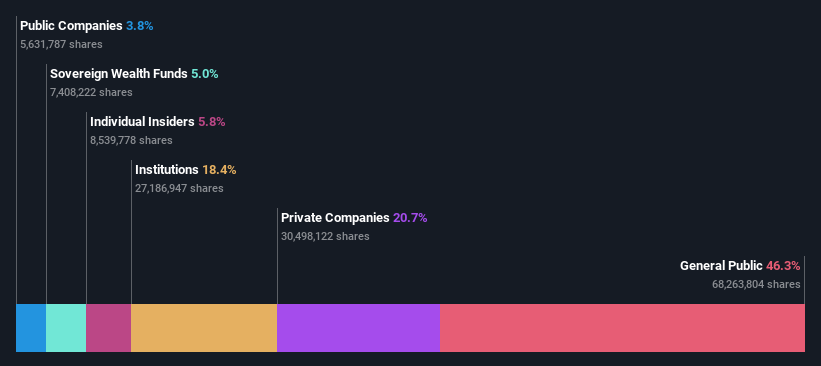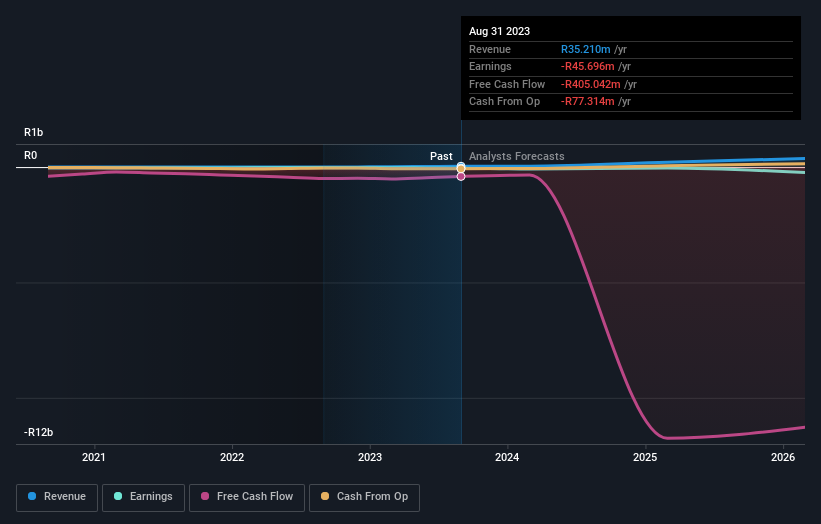Stock Analysis
- South Africa
- /
- Oil and Gas
- /
- JSE:REN
Retail investors among Renergen Limited's (JSE:REN) largest shareholders, saw gain in holdings value after stock jumped 16% last week

Key Insights
- Significant control over Renergen by retail investors implies that the general public has more power to influence management and governance-related decisions
- The top 11 shareholders own 50% of the company
- Insiders have been selling lately
If you want to know who really controls Renergen Limited (JSE:REN), then you'll have to look at the makeup of its share registry. We can see that retail investors own the lion's share in the company with 46% ownership. In other words, the group stands to gain the most (or lose the most) from their investment into the company.
Clearly, retail investors benefitted the most after the company's market cap rose by R280m last week.
Let's take a closer look to see what the different types of shareholders can tell us about Renergen.
See our latest analysis for Renergen

What Does The Institutional Ownership Tell Us About Renergen?
Many institutions measure their performance against an index that approximates the local market. So they usually pay more attention to companies that are included in major indices.
Renergen already has institutions on the share registry. Indeed, they own a respectable stake in the company. This can indicate that the company has a certain degree of credibility in the investment community. However, it is best to be wary of relying on the supposed validation that comes with institutional investors. They too, get it wrong sometimes. If multiple institutions change their view on a stock at the same time, you could see the share price drop fast. It's therefore worth looking at Renergen's earnings history below. Of course, the future is what really matters.

Hedge funds don't have many shares in Renergen. The company's largest shareholder is Mazi Asset Management (Pty) Ltd, with ownership of 8.4%. With 5.9% and 5.8% of the shares outstanding respectively, Matc Investments Pty Ltd and CRT Investment (Pty) Ltd are the second and third largest shareholders.
Looking at the shareholder registry, we can see that 50% of the ownership is controlled by the top 11 shareholders, meaning that no single shareholder has a majority interest in the ownership.
While it makes sense to study institutional ownership data for a company, it also makes sense to study analyst sentiments to know which way the wind is blowing. While there is some analyst coverage, the company is probably not widely covered. So it could gain more attention, down the track.
Insider Ownership Of Renergen
While the precise definition of an insider can be subjective, almost everyone considers board members to be insiders. Management ultimately answers to the board. However, it is not uncommon for managers to be executive board members, especially if they are a founder or the CEO.
I generally consider insider ownership to be a good thing. However, on some occasions it makes it more difficult for other shareholders to hold the board accountable for decisions.
We can see that insiders own shares in Renergen Limited. It has a market capitalization of just R2.0b, and insiders have R118m worth of shares, in their own names. This shows at least some alignment, but we usually like to see larger insider holdings. You can click here to see if those insiders have been buying or selling.
General Public Ownership
The general public, who are usually individual investors, hold a 46% stake in Renergen. While this size of ownership may not be enough to sway a policy decision in their favour, they can still make a collective impact on company policies.
Private Company Ownership
Our data indicates that Private Companies hold 21%, of the company's shares. It might be worth looking deeper into this. If related parties, such as insiders, have an interest in one of these private companies, that should be disclosed in the annual report. Private companies may also have a strategic interest in the company.
Public Company Ownership
Public companies currently own 3.8% of Renergen stock. It's hard to say for sure but this suggests they have entwined business interests. This might be a strategic stake, so it's worth watching this space for changes in ownership.
Next Steps:
It's always worth thinking about the different groups who own shares in a company. But to understand Renergen better, we need to consider many other factors. Consider for instance, the ever-present spectre of investment risk. We've identified 5 warning signs with Renergen (at least 2 which don't sit too well with us) , and understanding them should be part of your investment process.
Ultimately the future is most important. You can access this free report on analyst forecasts for the company.
NB: Figures in this article are calculated using data from the last twelve months, which refer to the 12-month period ending on the last date of the month the financial statement is dated. This may not be consistent with full year annual report figures.
Valuation is complex, but we're helping make it simple.
Find out whether Renergen is potentially over or undervalued by checking out our comprehensive analysis, which includes fair value estimates, risks and warnings, dividends, insider transactions and financial health.
View the Free AnalysisHave feedback on this article? Concerned about the content? Get in touch with us directly. Alternatively, email editorial-team (at) simplywallst.com.
This article by Simply Wall St is general in nature. We provide commentary based on historical data and analyst forecasts only using an unbiased methodology and our articles are not intended to be financial advice. It does not constitute a recommendation to buy or sell any stock, and does not take account of your objectives, or your financial situation. We aim to bring you long-term focused analysis driven by fundamental data. Note that our analysis may not factor in the latest price-sensitive company announcements or qualitative material. Simply Wall St has no position in any stocks mentioned.
About JSE:REN
Renergen
Renergen Limited, an investment holding company, engages in the alternative and renewable energy businesses in South Africa and sub-Saharan Africa.
Mediocre balance sheet with limited growth.

